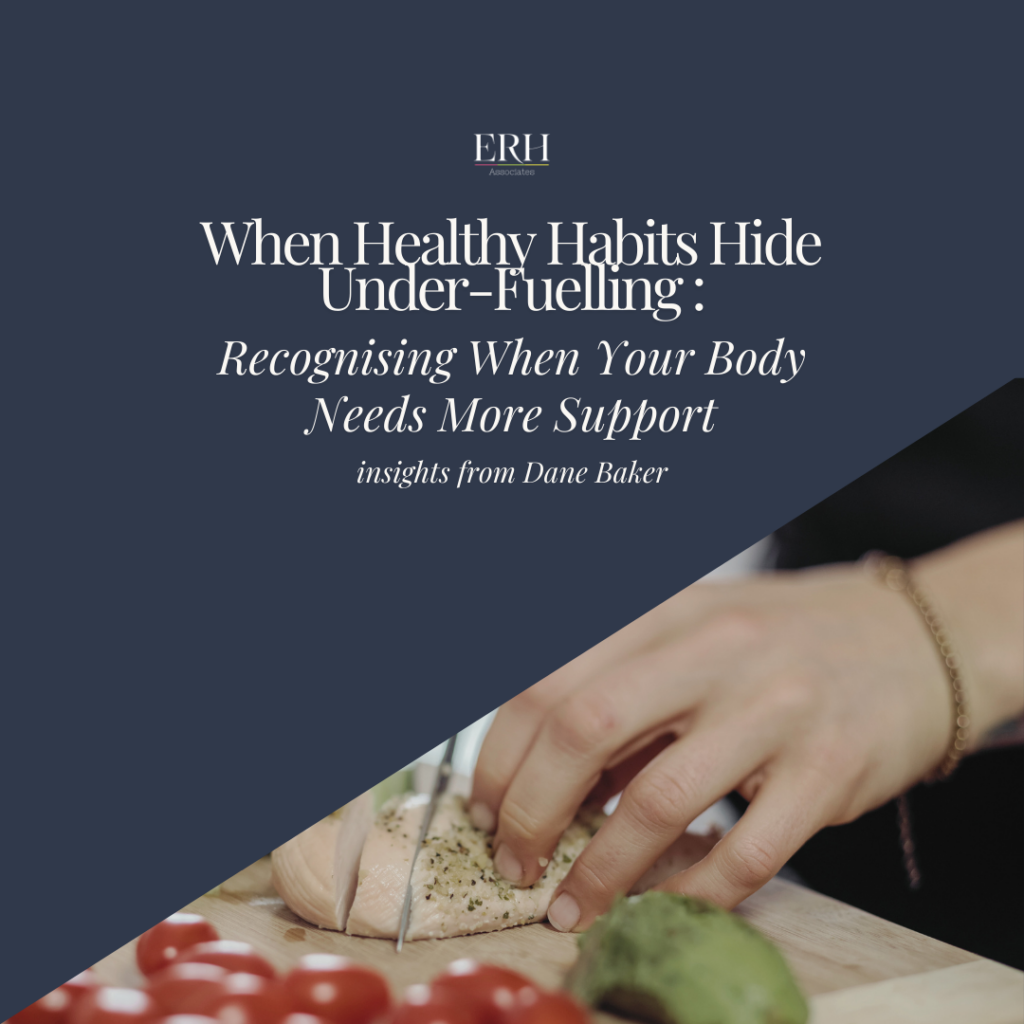Introduction
We often associate under-fuelling with restrictive dieting or elite athletic training — but in reality, it’s a surprisingly common issue among health-conscious individuals simply trying to do the right thing. At ERH Associates, we regularly see people who are eating nutritious foods and staying active, yet still falling short of the energy their bodies actually need.
Whether it’s stress, being busy, a habit of small meals, or a desire to “eat clean,” these patterns can lead to symptoms like fatigue, low mood, disrupted hormones, or difficulty recovering from exercise — even in the absence of obvious restriction.
To help shine a light on this under-recognised issue, we invited New Zealand Registered Dietitian and Performance Dietitian Dane Baker to share his insights. Dane works with both elite athletes and everyday individuals across all life stages, supporting those with RED-S (relative energy deficiency in sport), hypothalamic amenorrhoea (when periods stop) because of calorie deficit, midlife body composition changes and more. In this Q&A, Dane explains how unintentional under-fuelling develops, the early signs to watch for, and the power of structured, compassionate support to restore energy, metabolism, and long-term wellbeing.
How can under-fuelling happen even in people who are trying to eat ‘healthy’ or simply managing busy lives?
Under-fuelling — eating less than your body needs — is common, especially in busy lives where nutrition takes a back seat. Constant exposure to health messages and social media “wellness” trends can create confusion about what truly supports the body. If this energy shortfall persists beyond a few missed meals, it can become problematic low energy availability, leading to changes across the reproductive system, bones, muscle, metabolism, brain, and cardiovascular health.
What are some early warning signs that your body might not be getting enough energy — even if your food choices seem good?
Low mood and energy levels are often the first clues. Oestrogen levels may drop, affecting focus, irritability, and sleep. Metabolism may adapt in ways that make weight management more difficult despite healthy eating. Active individuals may notice more injuries, particularly in bone, or frequent illness. For menstruating women, any changes to the menstrual cycle — missed periods or altered cycle length — are important indicators and should be discussed with a GP if they persist.
How can stress, busyness, or long-standing habits of small meals contribute to low energy availability?
Stress raises cortisol, which in turn can disrupt reproductive hormones, increase body fat, and alter appetite. Some people restrict food to control weight, while others unintentionally eat less due to reduced hunger or busy schedules. Over time, the body can adapt by reducing appetite — so even small meals may feel satisfying, despite not meeting true energy needs.
Why might people experience symptoms like fatigue, poor recovery, hormonal changes, or low mood — even if they think they’re eating “enough”?
Appetite is an unreliable indicator of energy needs, particularly in low energy states. Research shows that people can feel full while still significantly under-fuelling — unlike thirst, where our brain signals clearly when we need more. In Dane’s recent work with patients recovering from low energy availability, nearly 90% underestimated their energy requirements.
What makes your approach different when supporting someone who’s unintentionally under-eating, compared to traditional nutrition advice?
Many clients are told to “eat more” or “add more carbs,” but without context, this can cause confusion or anxiety. Dane focuses on education first — explaining how the body adapts to under-fuelling — and then provides a personalised, structured fuelling plan based on the person’s needs and activity levels. This structure helps reduce the emotional and logistical overwhelm around eating.
For someone who feels anxious about “eating more” or has strong habits around food, how do you support them gently through that process?
The key is helping them understand how their symptoms are linked to low energy availability. Once people see how proper fuelling supports their health, it becomes easier to shift mindset. Dane walks clients through a gradual process, layer by layer, building sustainable habits that support long-term wellbeing.
What kinds of positive changes do people typically notice once they start fuelling their body properly again — even if their weight doesn’t change much?
One of the first improvements is mental clarity and a return of energy. Appetite also normalises over time, which makes eating enough easier. Sleep quality often improves quickly, and in active clients, aches, pains, and niggly injuries tend to lessen. Having a structured plan also reduces food-related anxiety and decision fatigue.
How can someone work with you if they want help restoring their energy, metabolism, and overall health?
Dane consults at Axis Sports Medicine, with clinics across Auckland, and offers telehealth nationwide. His initial appointments include a thorough assessment of your health history, daily habits, and goals. From there, he creates a personalised fuelling plan with clear, practical strategies — followed by tailored support to track progress and adjust as needed.
About Dane Baker
Dane Baker is a New Zealand Registered Dietitian and Performance Dietitian who works with both elite athletes and everyday individuals seeking to optimise their health. In addition to his work with New Zealand’s leading teams, Dane specialises in supporting patients with midlife body composition changes, RED-S, fertility issues, osteoarthritis, and diabetes. A founding member of WHISPA (Women’s Health in Sport Aotearoa) and a lecturer at the University of Otago, he is passionate about evidence-based, sustainable nutrition strategies that empower people at all stages of life — not just athletes — to feel and perform at their best.
Want to learn more or book an appointment with Dane?
👉 https://www.axissportsmedicine.co.nz/our-team/dane-baker
👉https://www.axissportsmedicine.co.nz/services/nutrition-clinic

Comments +